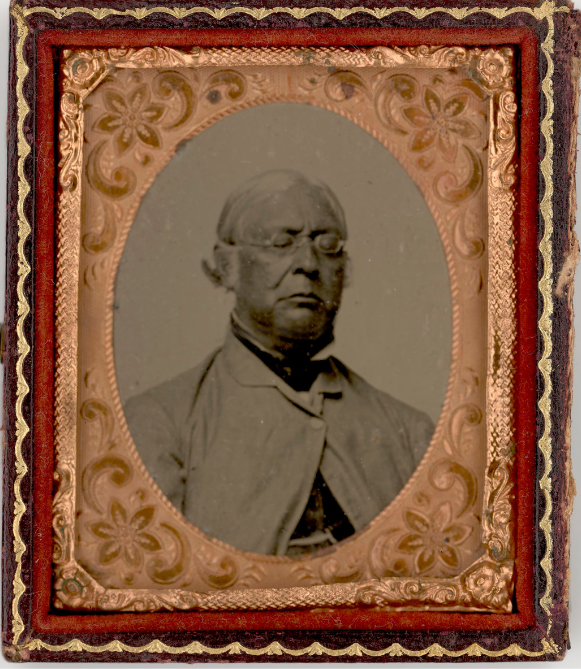ACTIVIST
"Blind" Joe Amos

Reverend “Blind” Joe Amos, one of four children, was born in 1806 to Jeremiah and Ophelia Hannah Amos.(1) Despite losing his sight at a young age, Amos mastered and performed as a fiddler.(2) A devout Christian, he memorized the Bible chapters recited to him by his mother, a talent that served him well when he became a minister later in life. Amos married three times, first in Mashpee to Abigail Wikham (Wickums), with whom he had several children, then to Phoebe Ann Pompey/Weadon on Nantucket, adopting her son Benjamin, and, finally, to Sophronia Sams on Martha’s Vineyard less than two months before he succumbed to a stomach ulcer.
Amos was well regarded for his moving sermons and tremendous command of the gospel. His devotion to the Baptist faith led him to establish the first Wampanoag Baptist congregation in Mashpee. He went on to establish two others, on Martha’s Vineyard among the Aquinnah and Chappaquiddick tribes, and spent some time preaching to the Herring Pond tribe.
Amos was a central figure in the 1834 fight for Mashpee’s Independence, working closely with the Pequot Methodist preacher and activist William Apes. Apes arrived in Mashpee to find Amos preaching to tribal members outdoors beneath a great tree, while Phineus Fish, the reviled Congregationalist preacher Harvard had appointed to the community, had locked the Mashpee tribal members out of their own church. Apes joined forces with Amos to organize a tribal campaign to remove Fish and the other overseers and gain independence for Mashpee. Although it took a little longer to finally remove Fish, Apes, Amos, and the Mashpee community were successful on both fronts. (3)
A highly engaged activist, inspired by his Baptist teachings, Amos became a founding member and vice-president of the Mashpee Temperance Society in 1833(4), and his signature can be found on an 1842 petition demanding that Massachusetts desegregate the railroads(5).
Considered cultural traditionalists, “Blind” Joe Amos, along with his family, and followers fought against the Massachusetts move to end the restriction on the sale of the Mashpee tribal lands that had been communally held for thousands of years. Despite the clear majority of Mashpee tribal members being against ending the restriction, Massachusetts did just that in 1870 (6), paving the way for a land grab by neighboring white communities.
1. Reverend Joseph Babcock (Blind Joe) Amos (https://www.familysearch.org/search/tree/results?count=20&q.anyDate.from=1806&q.anyPlace=Mashpee&q.givenName=Jospeph&q.surname=Amos)
2. Tavares-Avant, Joan. “Tales From Granny Squannit: The Story Of Preacher Blind Joe Amos” The Enterprise, Mashpee, Feb 12, 2021
3. “Amos, Joseph, Rev., 1805–1869” Native Northeast Portal
https://nativenortheastportal.com/bio/bibliography/amos-joseph-rev-1805-1869
4. Apess, WIlliam; Snelling, William Joseph. “Indian nullification of the unconstitutional laws of Massachusetts, relative to the Marshpee tribe: or, The pretended riot explained. By William Apes, An Indian and preacher of the gospel.” Boston Press of J. Howe. 1835.
5. Digital Archive of Massachusetts Anti-Slavery and Anti-Segregation Petitions, Massachusetts Archives, Boston MA, 2015, "Senate Unpassed Legislation 1842, Docket 11057, SC1/series 231, Petition of William Holland",
https://doi.org/10.7910/DVN/Q607G, Harvard Dataverse, V4
6. Cason, James Casson, Associate Deputy Director, Department of the Interior. “Summary under the Criteria for the Proposed Finding on the Mashpee Wampanoag Indian Tribal Council, Inc.” 2006


